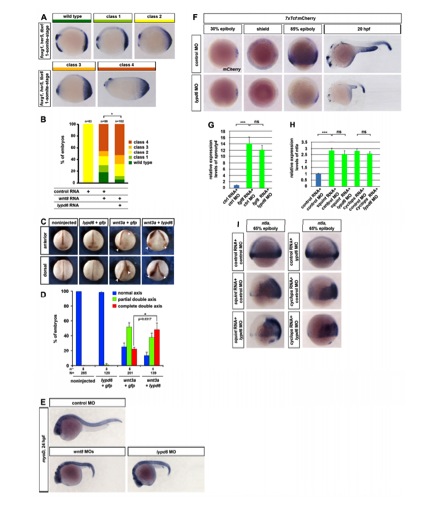Fig. S2
Lypd6 specifically enhances Wnt/β-catenin signaling in zebrafish and Xenopus embryos.
related to Figure 2.
(A-B) wnt8-induced anteroposterior patterning defects are enhanced by lypd6 overexpression during zebrafish gastrulation.
(A) Range of phenotypes at the 1-somite stage caused by wnt8 RNA (20 pg) overexpression determined by WMISH using the forebrain marker foxg1a, the midbrain-hindbrain boundary marker her5 and the posterior mesoderm marker tbx6. Class 1, reduction in foxg1a and her5; class 2, substantial loss of forebrain marked by foxg1a; class 3, complete loss of foxg1a, expansion of tbx6; class 4, dorsalization indicated by football shape of the embryo.
(B) Co-injection of lypd6 RNA (80 pg) enhances the severity of phenotypes, defined in A, induced by wnt8 RNA (20 pg) in comparison to embryos co-injected with equimolar amounts of spGFP-GPI control RNA.
(C-D) Secondary axis induction assay in Xenopus embryos.
(C) Zebrafish lypd6 (2 ng) enhances the induction of a secondary body axis by wnt3a (5 pg) injection, axes are marked by arrowheads.
(D) Quantification of the experiment shown in (C). n, number of independent injection experiments; N, Total number of analyzed embryos. Error bars, s.e.m.
(E) Injection of 10 ng lypd6 MO produces a phenotype similar to that generated by injection of 2.5 ng wnt8 MO1 and MO2 each. Embryos have posterior truncations evident by a reduced number of somites marked by myoD. number of somites = 28±1 in control MO [n=20 embryos], 20±3 in lypd6 MO [n=24 embryos], 17±2 in wnt8 MOs [n=23 embryos].
(F) Injection of 10 ng lypd6 MO downregulates 7xTcf:mCherry reporter activity from shield stage onwards as detected by mCherry expression. Note that lypd6 knockdown has no effect on reporter expression at the 30% epiboly stage.
(G) lypd6 MO (10 ng) does not affect Fgf signaling as determined by qRT-PCR of the pathway target sprouty4 at early gastrula stages. Fgf signaling was activated by injection of 20 pg fgf8 RNA. Error bars, s.e.m.
(H) lypd6 MO does not affect Nodal signaling determined by qRT-PCR of the pathway target gene ntla at early gastrula stages. Nodal signaling was activated by injection of 30 pg squint (ndr1) or 30 pg cyclops (ndr2) RNA. Error bars, s.e.m.
(I) lypd6 MO has no effect on ectopic expression of ntla induced by squint or cyclops RNA assayed by WMISH at 65% epiboly.
Reprinted from Developmental Cell, 26(4), Özhan, G., Sezgin, E., Wehner, D., Pfister, A.S., Kühl, S.J., Kagermeier-Schenk, B., Kühl, M., Schwille, P., and Weidinger, G., Lypd6 Enhances Wnt/beta-Catenin Signaling by Promoting Lrp6 Phosphorylation in Raft Plasma Membrane Domains, 331-345, Copyright (2013) with permission from Elsevier. Full text @ Dev. Cell

